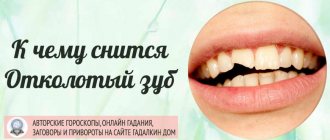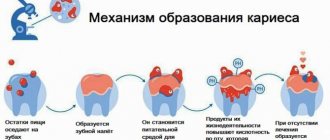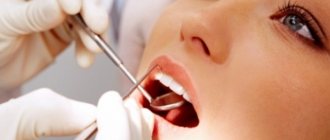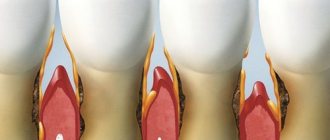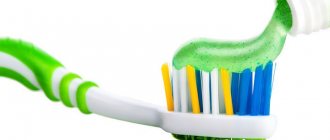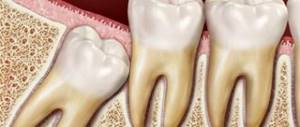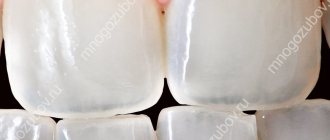Why can teeth crumble in adults?
The main cause of tooth decay in adults is damage to the enamel. Other factors also lead to such negative manifestations:
- Insufficient/improper oral hygiene. The accumulation of plaque on enamel contributes to the development of caries. If left untreated, a large cavity will form over time. The walls of the tooth become thin and begin to crumble. If you brush your teeth incorrectly, your enamel can also be damaged.
- Hormonal imbalance. It is observed in endocrine diseases in adolescents, pregnant women, and the elderly. In this case, the acidity of saliva increases, causing it to lose its protective properties. As a result, the teeth are gradually destroyed.
- Wrong diet. The body must receive the required amount of useful substances, in particular calcium and fluorine, which are important for strengthening the enamel. Sweets cause particular harm to her. Drinking low-quality water also negatively affects the condition of teeth.
- Mechanical damage. They can be obtained as a result of bad habits, for example, when a person bites nails, the tip of a pen, etc. Biting super-hard foods also leads to damage. As a result of sudden temperature changes, microcracks form. With bruxism (grinding your teeth in your sleep), the enamel is worn away and the teeth begin to decay.
- Common diseases – metabolic disorders, diabetes, thyroid dysfunction. Teeth can also crumble due to connective tissue diseases - arthritis, osteoporosis, rheumatism.
- Bite abnormalities. Uneven teeth cause enamel wear. This problem also occurs in the absence of teeth.
- Bad habits. Alcohol leaches calcium from dental tissue, and smoking contributes to the formation of plaque on the enamel.
Tooth crumbles after unsuccessful dental treatment, as well as as a result of severe allergic reactions. The destructive process can also begin from an excess of fluoride. Residents of regions where there is a large amount of this element in the water are prohibited from using fluoride-containing toothpastes.
If children's teeth are crumbling...
Teeth change color and become extremely sensitive to hot and cold: as soon as children have permanent teeth, many already suffer from so-called molar hypomineralization (MIH).
This is a special form of disruption of the formation of tooth enamel. First of all, this disease affects the chewing teeth. But incisors can also suffer from this disease.
A lack of minerals makes teeth porous. Teeth affected by MIH have fewer minerals present than are present in healthy teeth. First of all, they have a lower concentration of calcium and phosphates. As a result, teeth become porous, and this, in turn, leads to very rapid development of caries.
When affected molars erupt in schoolchildren, molar hypomineralization is now diagnosed quite simply. But just a few years ago the situation was completely different, since this form of diagnosis simply did not exist yet.
The picture of the disease has only recently been described. It was not until 2001 that this phenomenon was brought together under the term Molar Incisor Hypomineralization (MIH), that is, “mineral deficiency in the molars and incisors.”
This approach has significantly improved the diagnosis of children's and adolescent teeth. After all, before this, it was very difficult for the dentist to determine whether the tooth was porous even before the onset of the disease or whether it was a matter of ordinary caries.
Every tenth child has problems with the formation of tooth enamel. Doctors say that the problem of MIH affects ten percent of children, and in five percent it manifests itself in a severe form, accompanied by significantly increased sensitivity and loss of substance.
In adults, it is much more difficult to assess the extent of molar hypomineralization. Even if they had manifestations of MIH, the teeth affected by this disease in most cases have already undergone treatment and restoration, for which reason an appropriate diagnosis is no longer possible.
The causes of MIH should probably be sought in pregnancy. It has not yet been possible to determine where MIH originates from. Doctors admit that they can only guess about the causes of this disease. For example, problems during pregnancy are considered, which could theoretically have a negative impact on dental development.
In addition, events that occur in early childhood, such as high fever infections, antibiotic use and respiratory diseases, as well as dioxin in breast milk, are also suspected. It is possible that the cause of MIH is a combination of several different factors.
Doctors use different methods to treat molar hypomineralization. If MIH is detected in the early stages, the teeth are usually “sealed,” meaning they are coated with a special compound. In more complex cases, fillers and even crowns are used.
Treatment: special dental care, in some cases – removal. In some severe cases of violations of the formation of tooth enamel, the decision remains with the doctors: does a particular tooth have the prospect of long-term preservation? But if a tooth still has to be removed, it should be taken into account that the issue of filling the vacated space must be resolved as soon as possible, since in this case, due to the increased load, neighboring teeth will also suffer.
And you should remember: if children suffer from problems with the formation of tooth enamel, they should brush their teeth only with soft toothbrushes, using fluoride-containing toothpastes.
Why can children's teeth crumble?
Often parents notice that their child’s teeth have begun to crumble and do not understand why this happened to their baby. The milk bite has its own characteristics. The enamel of the first teeth is porous and thin. Because of this, it is highly susceptible to the negative influence of external factors. A large amount of sweets in the diet, consumption of carbonated drinks, poor hygiene - all this together leads to the proliferation of pathogenic microflora and the development of caries.
In children, the disease progresses rapidly and a large carious cavity forms. The tissues are destroyed, and in advanced cases there is nothing left of the crown.
Other possible causes of the pathological process in children:
- Violation of the formation of the primordia of the dentition in the womb. This can happen due to the use of certain medications by a pregnant woman, severe toxicosis, bad habits (smoking, alcohol).
- Poor nutrition of the mother during breastfeeding. In this case, milk does not contain all the nutrients necessary for the proper formation of dental tissues. Also, the baby may not receive enough vitamins and microelements if complementary foods are introduced untimely or if they are monotonous.
- Long-term use of pacifiers and bottles with nipples. These factors disrupt the correct position of the front teeth, which often leads to their crumbling. Even the habit of sucking your fingers has a negative impact on your bite.
- Genetic predisposition. If parents' teeth are crumbling, then there is a high probability that this process will begin in the child.
Even a one-year-old baby can lose teeth, especially if he had to use antibiotics at such an early age.
Often children's teeth are so destroyed that only “stumps” remain. This happens because many parents believe that nothing needs to be done, since the primary bite will change. This is a big misconception. Inferiority of the dentition leads to serious consequences: disturbances in the functioning of the gastrointestinal tract, the development of malocclusions, and improper growth of permanent teeth. If measures are not taken to eliminate the causative factors, the process may subsequently affect the enamel.
Causes
There are many reasons why a child's teeth crumble. Both genetic disorders and basic hygiene can play a negative role. If we take a situation in which teeth lack minerals, tooth growth may be accompanied by problems and defects. In this case, their surface often crumbles on its own.
One of the factors of the problem is a violation of the child’s development even at the stage of fetal development. This may be the result of eating the wrong foods, unhealthy foods, drinking alcohol, psychological conditions and toxicosis. The general lifestyle of the expectant mother plays a big role. If it is full of stress and negativity, then this will in any case affect the child’s health.
The main causes of tooth decay:
- negative heredity in a child;
- intrauterine development disorder;
- violation of diet;
- little attention to oral hygiene.
Nutrition plays a major role in the causes of dental problems. The less sweets a child eats, the better. It is best to replace artificial sweets with fruits rich in vitamins. In addition, you should not get carried away with night feedings, which serve as a calming factor for the child. The same applies to the pacifier, since its constant presence in the mouth negatively affects the teeth.
Parents often forget about such a rather banal thing as hygiene or do not pay due attention to it. When baby teeth begin to grow, many do not know what to do and what care is needed. Buy a soft small brush and start brushing your baby's teeth little by little. This will avoid the development of caries, which causes the child’s baby teeth to crumble.
In the future, the child needs to instill the desire for hygiene as a habit and monitor its implementation. The child will not always brush his teeth himself, so you should not leave it to chance. Encourage hygiene; you can turn the whole process into a game and motivate your child.
At a young age, children love to constantly chew on something. It doesn’t matter what it is, plastic, rubber or iron parts of the toy. This is where defects in tooth enamel can begin to appear. This could be the consequences of erasure or infection, which is much worse than the first option. Of course, it is natural for a child to explore the world in all possible ways. But the task of parents in this case is to at least limit the number of objects that are put into the mouth.
How is diagnostics carried out?
Are your teeth starting to crumble? Don't hesitate to see a doctor. Only a specialist can correctly determine the cause of the pathology. The dentist will conduct a visual examination of the oral cavity, collect anamnesis, and assess the degree of damage. To perform a more accurate diagnosis, in some cases you may need:
- general and biochemical blood test;
- X-ray;
- blood test for hormone levels;
- allergy tests.
If the doctor suspects the presence of general diseases, the patient will be referred to other specialists. They will confirm or rule out diseases that cause tooth decay.
Teeth are crumbling: what to do
Interested in what actions to take to stop the pathological process? The first thing to do is make an appointment with your doctor. After diagnosis and identification of the causative factor, manipulations will be carried out aimed at eliminating it. If tooth decay is caused by one of the general diseases of the body, you must first cure it.
Dental manipulations
The following measures can be used to save teeth:
- Mineralization. Applications are applied to damaged areas of the dentition to enrich the tissues with fluoride and calcium. The number of such procedures and their duration are determined in each case individually.
- Filling. Using composites, the doctor restores the tooth and gives it its natural shape. It is important to treat caries in a timely manner. In advanced cases, it is necessary to remove the nerve that provides nutrition to the tooth, so the tissues lose their hardness.
- Microprosthetics. The doctor restores the tooth using ceramic inlays and crowns if it has collapsed by more than 50–80%. These designs hide all the imperfections of the dentition. High-quality modern materials are used in the manufacturing process, so they will last a long time.
- Restoration with lumineers and veneers. For minor damage to the front teeth (chips, chips), special ceramic onlays are used that will last 10–15 years.
If you consult a doctor in time, it is not difficult to restore the aesthetics of your smile. You can even eliminate teeth grinding, although this is quite difficult to do. Sometimes a consultation with a neurologist is required, who will prescribe sedatives. To protect tooth enamel, a custom silicone mouthguard is made. You need to wear it at night. This will ensure the safety of the crowns even when grinding.
General recommendations
To stop tooth decay, you must follow these recommendations:
- to refuse from bad habits;
- change your diet - add dairy products, sea fish, nuts, legumes, sesame seeds, vegetable oils, fresh vegetables and fruits;
- improve hygiene (if this is the reason) - special attention should be paid to cleaning the interdental spaces; plaque from the cheeks and tongue should also be removed;
- Use toothpastes containing fluoride and calcium.
Prevention
During pregnancy, to avoid health problems for the baby, take vitamins and take care of your diet. You need to eat more fresh vegetables and dairy products. This approach, together with exercise in the early stages, will contribute to the healthy development of the fetus. To treat crumbling in a newborn baby, there are methods that need to be used depending on the age of the child; we will consider them below.
At one year old
What to do at this age is to provide proper and healthy nutrition to the child. Food should be rich in minerals and vitamins. This not only has a positive effect on the baby’s teeth, but also on his overall health.
It is from this age that it is necessary to begin careful oral hygiene. When there is no tooth yet, the gums can be wiped with light movements with a cotton swab.
At two years old
From the age of two, when the first incisors of the teeth begin to appear, it is important to immediately begin to monitor them until they reach independent age. The issue of healthy eating concerns not only the teeth, but the entire body. Therefore, all food should contain vitamins, calcium and other beneficial substances. With this approach, at 2 years old you won’t have to worry about caries and crumbling.
Actions for wisdom tooth decay
Special attention should be paid to the “eights”. If we were talking, for example, about the second molar, then they would definitely try to save it. But regarding wisdom teeth, opinions differ. This is due to their characteristics. “Eights” do not have predecessors, so their eruption is often painful. There is no space in the oral cavity for these teeth, so they often bump into “neighbors,” partially erupt, or do not appear at all. Such teeth do not bear a functional load. The blood supply to the “eights” is weak, so they quickly become fragile.
The position of the third molars makes cleaning difficult. The accumulation of food debris (which is especially evident if the wisdom tooth has partially grown) creates a breeding ground for bacteria. Therefore, “eights” are highly susceptible to caries and inflammation.
What to do if a wisdom tooth crumbles? It seems that it causes more problems than it is worth. He does not take part in chewing. But if the destruction is not severe and it is possible to save the tooth, then many specialists still decide in favor of treatment. Firstly, it can take over the functions of the second molar if it is lost. Secondly, the “eight” can serve as a support for prosthetics of the “seven” and “six”. Thirdly, in case of adentia, including those associated with age-related changes, the wisdom tooth is an additional frame for the facial muscles.
The “eight” can be removed if the crown is severely or completely destroyed, if the tooth is impacted or if inflammatory processes, suppuration, or neoplasms on the root have developed, or with limited access for treatment.
Treatment
If crumbling is detected, you should immediately contact your dentist. He will ask you about your complaints in detail and then conduct a thorough examination of your oral cavity. After the examination, the doctor will prescribe treatment. There are three main methods: silver plating, fluoridation and ozonation.
Silvering
A fairly common treatment method, especially for children whose teeth have crumbled. The method is also applicable to children who are afraid of dental instruments.
A tooth that has been silvered can remain healthy and intact until new ones grow. In particular, the method helps fight caries and is effective in the initial stages of crumbling.
Effects of use:
- counteracting the growth of bacteria in the oral cavity;
- treatment of caries in the initial stages;
- helps those whose teeth are too sensitive;
- prevents carious relapse;
- if there is a filling, then silvering will have a positive effect on it.
Fluoridation
Few parents know that baby teeth differ from permanent teeth in the structure of their tissues and the presence of a loose surface. Therefore, on baby teeth, caries develops faster. In the case of fluoridation, fluoride molecules increase the density of enamel through the bonding of dentinal tubules. There are age restrictions for this method. This procedure is done only at the age of 4 years.
Fluoridation happens:
- Superficial. Strengthening varnish and gel are applied to the enamel, which perform the task of preventing the disease.
- Deep. It is used when it is necessary to preserve baby teeth until they are completely replaced. The doctor applies a sealing gel-like liquid to the enamel. It penetrates deep into dense tissues and strengthens them.
- Manual. The dentist makes a composition of copper and calcium hydroxide. The resulting liquid is applied to the teeth and then washed off with water.
The advantages of this treatment:
- enamel density improves several times;
- counteracts caries;
- on average, several procedures per year are enough;
- has a positive effect even in the later stages of caries;
- affects the decrease in sensitivity.
Ozonation
This method plays more of a preventive role than a therapeutic one. Being a fairly strong oxidizing agent, ozone penetrates into the cracks inside the oral cavity without damaging soft tissues. On its way, it destroys harmful bacteria and also sterilizes the surface.
What can be achieved with this method:
- stopping the deformation of crumbling teeth;
- counteraction to caries;
- cleansing the oral cavity from microbes.
Children's teeth can be protected from problems if you regularly take care of them and eat a balanced diet. If crumbling does begin, the available treatment methods are simple, do not require surgical intervention, and their implementation does not take much time.
How to provide first aid for severe pain
Sometimes teeth decay slowly and without pain. The process can go unnoticed. But there are cases when tissues are destroyed abruptly. This threatens to expose the pulp. Due to nerve irritation, severe pain appears, which prevents you from sleeping or eating. To alleviate the condition before visiting a doctor, it is worth clearing the cavity of food debris and rinsing your mouth with a soda-salt solution at room temperature.
You should also take an analgesic. If possible, it is better to consult a doctor regarding its choice. You should not take painkillers just before your visit to the dentist’s office, as it can hide the clinical picture.
Do I need to treat rotten teeth?
Of course, it is necessary to treat any damage to baby teeth. The loss of one or more milk units can affect the correct formation of the bite in later life. In addition, the destruction of hard tissues inevitably leads to inflammatory processes in the surrounding soft tissues. If you do not deal with the problem in a timely manner, then there is a high risk of developing an abscess, meningitis, sepsis, etc.
Quite often, dental caries does not manifest itself in any way until the child’s immune system is weakened due to illness or a common cold. The consequences can be quite serious: sinusitis, pain in the ears (otitis and other problems), digestive problems, intestinal disorders and stool disorders, as well as severe stomach pain.
In addition, rotten teeth look very unsightly even in a child. Older children may begin to feel complex about their appearance; they will develop self-doubt and tightness. That is why it is very important to periodically check the condition of your baby’s teeth, because it is much easier to eliminate the problem at an early stage.
previous post
The difference between paid and free anesthesia
next entry
Preventive actions
It is better to prevent any disease than to treat it. Therefore, in order to strengthen your teeth and prevent their fragility, you must follow these recommendations:
- Carefully and regularly care for your oral cavity using a properly selected toothbrush and toothpaste. Use dental floss, mouthwash, irrigator, and brush for hygiene procedures. Do not use a brush that is too hard, especially if you are prone to crumbling. After each meal, if possible, rinse your mouth with special solutions or at least water.
- Visit the dentist regularly: for adults - at least once every six months, for children - once every 3-4 months. This will allow diseases to be identified and eliminated in a timely manner. Periodic professional teeth cleaning will make it possible to get rid of plaque and tartar, which become a favorable environment for the development of pathogenic microflora.
- Massage the gums to improve metabolism in dental tissues. It is useful to strengthen the gums by rinsing the mouth with infusions of herbs (sage, oak bark).
- Do not follow the rules of a strict diet without consulting a nutritionist.
- Eliminate bad habits (biting seeds, pistachios, nails, etc.), do not smoke or drink alcohol.
- Keep your child's hands clean. Fruits and vegetables that are offered to him must be clean. It is imperative to maintain oral hygiene. You need to start caring for your teeth immediately after they erupt.
- Do not accustom your child to a pacifier. Otherwise, you should wean yourself off it as quickly as possible. It is also not recommended to feed your baby from a bottle with a nipple for a long time. It is important to ensure that the child does not fall asleep with it in his mouth. The remains of the sweet nutritional mixture provoke the development of so-called bottle caries, due to which the teeth turn black and crumble.
- Limit your consumption of sweets. The child must be introduced to complementary foods strictly according to the rules. You should consult your pediatrician on this issue.
For children, fissure sealing can be performed as a preventive measure. Often, caries develops in the grooves present on the surface of the chewing teeth. They are difficult to clean. In order to prevent caries, the doctor seals the cavities with a special material containing fluoride, therefore at the same time mineralizing the dental tissues.
What to do if your teeth are crumbling?
Of course, it will not be possible to restore already crumbled teeth, but this process can be stopped, and only at the initial level of destruction.
Approaching the issue responsibly, instead of sweet candies, offer your baby finely chopped hard vegetables and fruits - they will help clean baby teeth and increase salivation.
Include foods containing calcium, fluorine, and phosphorus in your baby’s menu, after consulting with your pediatrician and pediatric dentist about a course of medications and vitamin complexes.
Gradually teach your child to brush his teeth in the mornings and evenings , and also talk about how important it is to rinse the mouth after meals , which does not require a special solution; it is enough to rinse with ordinary clean water.
Such prevention is also relevant for visible tooth decay . But still go to the dentist, although the child will not be entirely pleased, understand that treatment cannot be delayed.
A number of procedures will help stop tooth decay: fluoridation, silvering, fissure sealing.
For example, fluoridation on baby teeth needs to be done about once every 3 months; it is invisible, unlike silvering, although it is most effective.
